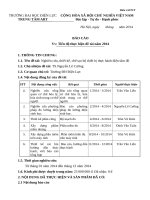Điện tử viễn thông c1 6 thoại qua IP (VoiceOverIP) khotailieu
Bạn đang xem bản rút gọn của tài liệu. Xem và tải ngay bản đầy đủ của tài liệu tại đây (535.32 KB, 25 trang )
TRƯỜNG ĐẠI HỌC ĐIỆN LỰC
KHOA ĐIỆN TỬ - VIỄN THÔNG
TỔNG ĐÀI &
KỸ THUẬT CHUYỂN MẠCH
Chương 1: Lý thuyết tổng quan và cơ sơ
VI. Thoại qua IP (VoiceOverIP)
Giảng viên: Phan Thị Thanh Ngọc
1
EPU - 2012
Multi-media & Data Integration
Benefits
• Productivity increases
– Voice and even multi-media communications become part of
office automation and web environment (“click to talk”).
• Infrastructure savings
– PABX and separate telephone wiring replaced by additional
capacity requirements on data network
– Reduced external telecommunication costs
– Maintenance and management reduced to one single network
• Increased reliability
– PABX single point of failure could be replaced by distributed
software
2
J.Tiberghien - VUB
The Multi-media challenge
Traffic characteristics
Throughput:
Correctness:
Delay:
Data
Voice & Images
Bursty
Essential
Unimportant
Stable
Non-essential
Small & Stable
Conclusion:
Data and multi-media traffic have
totally different requirements
Mixing them on a single network is
technically and economically challenging
3
J.Tiberghien - VUB
Multi-media & Data
Integration
Challenges
• Control over delays in IP networks
? Enough network capacity
? GMPLS
? IP V6
? New transport protocols
• Reliability and availability culture in data networks
• Power via data cables for IP phones
• Organizational and cultural changes
• Addressing and Directory management
4
J.Tiberghien - VUB
Real Time Voice over the Internet
The initial goal : free international calls
Internet
Sound enabled PC
(full duplex)
Sound enabled PC
(full duplex)
- To communicate, precise appointments need to
be made, ... by phone ?!?
- IP addresses on both sides need to be known
- Voice quality dependent on network delays
- Acceptable if network not overloaded
5
J.Tiberghien - VUB
Internet
Telephony
Low cost
POTS
emulation
Local
PSTN
Internet Telephone
Gateways
Local
PSTN
Internet
+ Access through local PSTN
- Quality dependant from network load
6
J.Tiberghien - VUB
Internal
Communications
• Internal communications in many organizations :
– voice : PABX
– data : intranet
• If geographically separated sites :
– voice : PABX’s interconnected via
» leased lines
» public telephone network
– data : Intranets interconnected via
» leased lines
» Virtual Private Networks
7
J.Tiberghien - VUB
Traditional
Communications
in multi-site
organizations
WAN
Intranet
PABX
8
PSTN
PABX
J.Tiberghien - VUB
PABX & Intranet
Integration
Transport POTS
costs lower
for traditional
and data
for data than for
telephony !
PSTN
PABX
WAN
Intranet
PABX
PSTN
PABX needs to be
IP compatible
9
J.Tiberghien - VUB
Full voice-data
Infrastructure
Integration
savings
+
Productivity gains
WAN or LAN
Intranet
What about the 109 pots users ???
10
J.Tiberghien - VUB
Full voice-data
Integration
Infrastructure
savings
+
Productivity gains
WAN or LAN
Intranet
PSTN
11
H231 Gateway
J.Tiberghien - VUB
•
The role of
SIP
Voice or multimedia (= voice,
images, streaming music and video,
streaming computer data, …) communication implies a “connection”
between two or several people.
• The host addresses and the port numbers of the appropriate
applications that need to be connected to enable these people to
communicate need to be identified.
• The nature and the characteristics of the communication between these
applications needs to be negotiated
• The connection needs to be established
• The connection needs to be maintained, even when the address of some
partners change (mobility)
• Mobility might imply renegotiation of the communication
characteristics
• When no longer needed, the connection needs to be closed.
12
J.Tiberghien - VUB
Addresses & Directories
• Addresses are hard to memorize numbers
– Tel :
+32 (0) 2 673 64 76
– Gsm :
+32 (0) 475 81 27 93
– ip :
134.184.1.25
– ipV6:
64.0.0.0.0.0.0.0.0.0.0.0.134.184.1.25
• Need of directories, but hard to maintain consistency
• Internet solution :
– DNS = distributed directory
– Local addresses maintained by local authority
13
J.Tiberghien - VUB
Internet
Root
Domains
uk
ibm
be
edu
mtv
ac
vrt
ulb
tiberghien
com
org
ieee
vub
info
tiberghien
14
J.Tiberghien - VUB
Domain Name
• In Each domain, there
is at least one DNS
Servers
– Name & DNS Address of all subdomains
– Name & address of all hosts in the domain
– DNS address of, at least, root of DNS system
– Names & DNS addresses of frequently used domains
• Each host must know the address of one DNS
• Address resolution can be done recursively or by
successive calls to different DNS
• Local DNS is locally maintained
• Caching greatly improves performance of DNS by
keeping the translations of most recently accessed
domains and hosts
15
J.Tiberghien - VUB
Names vs.
• A name identifies a service
Addresses
– The mail service of a specific person (mailbox)
– The web service of a specific company
• An address specifies a host on which services are available
• Several names can be linked with a single address
–
–
• Several addresses can be linked with a single name
– Redundant web servers
• DNS assumes stable links between names and addresses
– Machines offering services have stable addresses
16
J.Tiberghien - VUB
Beyond
• For some applications DNS is insufficient
DNS
– Internet telephony = person to person service
– At different times, people are at different locations
– Personal computers seldom have unique address
– One person can be reached through different devices, with
different service levels.
• Session Initiation Protocol (SIP, RFC 3261)
– A SIP server is an agent that handles multi-media services
for one or several people:
» As any server, it has a stable address
» It knows the present address of the people it works for
» It establishes and manages connections between multimedia communicating applications.
17
J.Tiberghien - VUB
Session Initiation
Protocol
The SIP server can handle both diversity
in terminals and mobility of terminals
18
J.Tiberghien - VUB
SIP
functionality
• Call forwarding, unconditional, on busy, …
•
•
•
•
•
•
•
•
•
•
19
Call transfer
Caller ID
Call hold
Multiparty conferences
Call return
Follow me
Find me
Call queuing
Do not disturb
……
J.Tiberghien - VUB
SIP in Redirection
mode
SIP
Redirection
server
Callers network
Home network
Actual
Data transfer
Session
set-up
• Most efficient data transfer
• Caller has access to actual
called address
20
Mobility
management
Visited network
J.Tiberghien - VUB
SIP in Proxy
Session
mode
set-up
Callers network
SIP
Proxy
server
Home network
Actual
Data transfer
• Longer transmission delays
• SIP server can be bottleneck
• Caller has no access to the
actually called address
21
Mobility
management
Visited network
J.Tiberghien - VUB
SIP
properties
• SIP is user friendly
– People accessed through their URLs
»
»
• SIP is well in line with Internet technology
– Commands in clear text (html)
– Few different commands
– Readable answers to commands
– Details of desired session described with SDP.
22
J.Tiberghien - VUB
SIP
Requests
Invite user to a session. The session
• INVITE
description is contained in the body of the message, using SDP.
The session description contains the address where the host
wants to receive media streams.
• ACK
Acknowledgment of an INVITE request
• BYE
Sent when a call is to be released
• OPTIONS
Query server about capabilities
• CANCEL
Cancel a pending request
• REGISTER
Register with a SIP server
Each SIP transaction has a unique identifier,
which identifies the session.
23
J.Tiberghien - VUB
SIP
references
• The initial designers:
www.cs.columbia.edu/sip/
• SIP Forum :
www.sipforum.org
• SIP Charter :
www.ietf.org/html.charters/sip-charter.html
24
J.Tiberghien - VUB
The Universal IP
Network ?
25
J.Tiberghien - VUB









